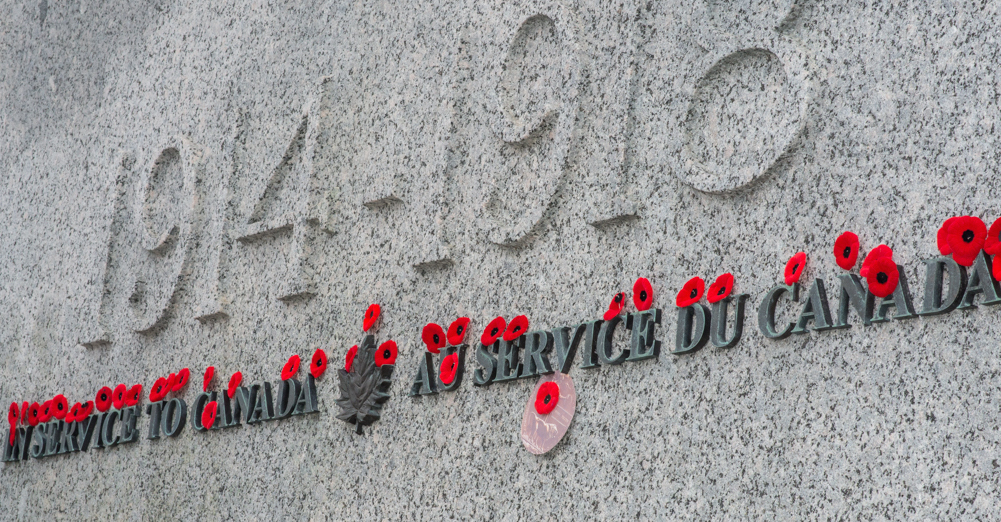Each year, we commemorate the sacrifices of thousands of Canadians who have fallen in battle over the years, including the heroic and necessary struggle to defeat fascism from 1939-1945. But I am mindful that the specific date of Remembrance Day — November 11 — marks the armistice that ended the First World War in 1918. For me, and doubtless for many others, that occasion poses a dilemma: how do we honour our ancestors’ sacrifices in that horrific conflict, without celebrating the arguably needless slaughter in which they participated?
Both my grandfathers were career soldiers in the British army — one a colonel, the other an eventual member of the Queen’s honour guard. Amongst the heirloom plaques in our living room, one is a service commendation from Field Marshal Douglas Haig — nicknamed the “butcher of the Somme” for sending thousands of young men over the top into deadly machine gun fire.
The best way to honour my grandfathers is to work to ensure that no future generation endures a similar hell.
And yet, there are disturbing signs that a century after 17 million died in the First World War, some of the same ugly forces are re-emerging, like ghouls from a medieval graveyard.
Historians have long debated the war’s causes. Was it inevitable, or did the European powers simply blunder into an avoidable catastrophe? Was it the systemic offspring of rapacious capitalism, or colonialist rivalry between European empires? Or were particular regimes especially at fault?
But whoever lit the fuse, nationalism and militarism were clearly ingredients in the powder keg. Historian Gary Sheffield, who identifies Germany and Austria-Hungary as prime instigators, nevertheless concedes that the pre-war arms race “helped create an atmosphere of distrust between the powers that fed into the wider mood of militarism; not just readiness to use armed force in support of state policy, but the excessive admiration of military culture, deference to armed forces, [and] belief in the benefits of war.”
Militarism’s equally evil twin was nationalism. Not the peaceful inclusive kind Gandhi practiced in leading India to independence, but rather, more virulent and chauvinistic varieties. Major European powers defined their identities via the possession of colonies. Within the heart of the European empires, minority nationalities rebelled against alien rule. However, they too often equated their own nation with a dominant ethnic group, relegating minorities to second-class status at best, and prizing national independence over other human values.
That kind of ethno-nationalism is resurfacing in Europe, the U.S. and elsewhere today. It is arguably in part a reaction against the breakneck globalization of “free” markets, which has generated wealth but also widespread economic insecurity and obscene levels of inequality.
Ethno-nationalism builds on a media diet of stories demonizing supposed enemies, as well as deeper myths of cultural or racial superiority, of long-ago grievances demanding redress, of national victimhood and righteousness. Is today’s Fox News much different from the “yellow press” of yesteryear?
War is rightly understood in relation to armaments, failed diplomacy, domestic political pressures, and economic interests. But we should also pay attention to structural violence — such as the denial of dignity through poverty, social exclusion and racism — and cultural violence.
“We think others to death as we define them as the other, enemy, non-people,” wrote historian E.P. Thompson in Protest and Survive. “The deformed human mind is the ultimate doomsday weapon.”
Chillingly, that statement might apply to too many nations’ leaders today who find ethno-nationalism a useful political device for maintaining power.
Former prime minister Pierre Trudeau usefully distinguished between patriotism (love of country) and nationalism. Sometimes patriotism means standing apart from the crowd to oppose a lemming-like rush to disaster.
Let’s honour not only the soldiers, but those who take risks to prevent war or to repair its damage. One example: Jean Jaures, the French statesman who foresaw the carnage that a European conflict would unleash, and worked tirelessly to prevent it — until he was murdered by a nationalist fanatic in 1914. Another tragedy of 1914 was the international workers’ movement’s failure to fulfill its pledge to stop European war through a general strike.
My family walked in the largest antiwar rallies in history, on the eve of the disastrous invasion of Iraq in 2003. Just as in 1914, it was fuelled by mass media-disseminated propaganda — that Saddam Hussein’s dictatorship was not only brutal (true) but had weapons of mass destruction, and was connected to al-Qaida (false).
Maybe excessive nationalism could be tempered by a peace curriculum that teaches students about their country’s historical sins as well as achievements. When I attended public school, we learned nothing about residential schools, let alone internal colonialism more broadly.
Cultural change is a long-term process. The school curriculum is surely now more inclusive and accurate than in my day. Meanwhile, consider observing Remembrance Day with special ceremonies, like the one at Vancouver’s Seaforth Peace Park, that commemorate refugees and other civilian victims of war, groups not normally included in traditional ceremonies.
I see this is a fitting way to remember the courage of our ancestors, but also the suffering and injustice associated with militarism and destructive forms of nationalism.
Robert Hackett is professor emeritus of communication at Simon Fraser University. He has published eight (mostly collaborative) academic books on media and politics, most recently Journalism and Climate Crisis in 2017. A version of this article was originally published in the Burnaby Now.
Image: Robbie/Flickr



